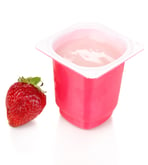
Choosing the right plastic for your application can be confusing, particularly if you are new to the industry. In our recent blog post, “When it Comes to material selection, not all plastics are created equal,” we gave a quick overview of the polymers that Impact extrudes, including extruded materials such as HIPS, touching on their general characteristics and typical uses.
In this next blog post, we narrow our focus to discuss one of the materials we extrude in greater detail – High Impact Polystyrene (HIPS). HIPS is a widely used hips material that is known for its versatility, durability, and impact resistance, making it suitable for applications in printing, graphics, merchandising displays, and tooling. Below are 7 important facts about HIPS plastic:
- HIPS is a modified form of polystyrene:
Polystyrene (PS) plastic is a naturally transparent thermoplastic material that is available in several forms. The most basic form of PS is general purpose PS (GPPS), also known as crystal PS. GPPS is a result of styrene monomer polymerization and it is a transparent product. Another common grade of PS is expandable PS (EPS). EPS is a foamed version of this material, often referred to as “styrofoam” which is a name for EPS trademarked by Dow Chemical Company in 1941. This material is commonly used in packaging applications such as foam meat trays or foam egg cartons.
- HIPS is a high impact strength material:
As the name would suggest, HIPS is a form of PS that carries with it a higher impact strength. Homopolymer PS can often be brittle, and can be made more impact resistant if combined with other materials. This form of PS typically is produced by adding around 5-10% rubber or butadiene copolymer. This increases the toughness and impact strength of the polymer and results in a very stiff product ideal for packaging applications. Due to the durable nature of this material, high impact polystyrene sheet firm Impact Plastics is used in packaging applications for a wide range of applications in the food, medical, consumer goods, cosmetics, industrial and horticultural markets among others.
- HIPS is an amorphous polymer:
Polymers exhibit two types of morphology in a solid state – amorphous and semi-crystalline. Whereas a semi-crystalline polymer refers to a plastic with organized and tightly packed molecular chains, the polymer chains for amorphous plastic materials are more disorganized. In an amorphous polymer the molecules are oriented randomly and are intertwined. To give you a visual, the organization, or lack thereof, of the polymer chains for amorphous materials are often compared to a plate of cooked spaghetti. Amorphous polymers like HIPS are isotropic in flow, meaning that shrink uniformly in the direction of the flow and transverse to flow. This typically results in less shrinkage and less warping than semi-crystalline polymers. Amorphous polymers are typically transparent, however HIPS is a translucent while in its natural state.
- HIPS is compatible with food packaging applications:
 HIPS is available in FDA approved grades and is compatible with food packaging applications. The rigid nature of this material makes it ideal for food packaging applications such as cookie and bakery trays or deli sandwich clamshells. While the moisture vapor transmission numbers aren’t as good as with other polymers, HIPS has inherent moisture barrier properties that make this material suitable for short shelf life products. In addition, improvements to particular grades of HIPS have resulted in good environmental stress crack resistance (ESCR), making this material suitable for the packaging of fatty foods such as butter. This material can be used in low-heat food packaging applications but it is not recommended for applications where the packaging will undergo heat higher than approximately 185°F.
HIPS is available in FDA approved grades and is compatible with food packaging applications. The rigid nature of this material makes it ideal for food packaging applications such as cookie and bakery trays or deli sandwich clamshells. While the moisture vapor transmission numbers aren’t as good as with other polymers, HIPS has inherent moisture barrier properties that make this material suitable for short shelf life products. In addition, improvements to particular grades of HIPS have resulted in good environmental stress crack resistance (ESCR), making this material suitable for the packaging of fatty foods such as butter. This material can be used in low-heat food packaging applications but it is not recommended for applications where the packaging will undergo heat higher than approximately 185°F. - HIPS is a good printable substrate:
High impact polystyrene can be decorated using a variety of printing methods including screen printing, offset lithography, and flexography. This material is compatible with corona treatment process0es which helps mitigate problems with adhesion to the plastic. - HIPS is a good printable substrate:
High impact polystyrene can be decorated using a variety of printing methods including screen printing, offset lithography, and flexography. This material is compatible with corona treatment process0es which helps mitigate problems with adhesion to the plastic. - HIPS is an easily processed & versatile:
Polystyrene is known as a very easy material to process in thermoforming and form-fill-seal processes. The inherent rigidity of this material offers key functionality such as the snap-ability and score-ability required for certain form-fill-seal packaging applications.In addition, polystyrene materials are FDA approved for food contact making them a suitable material for a range of packaging applications in the food, medical, consumer goods, cosmetics and even industrial markets.
- HIPS can be easily customized:
HIPS from Impact plastics is an easily customized material and is available in virtually any color under the sun. This material is compatible with a variety of processes and is therefore available in a vast range of colors, finishes and additive package formulations. Additional customization of HIPS sheet from Impact include:
- Custom color match HIPS including pearl, iridescent, and metallic colors
- Custom Embossing including small square, diamond plate & brushed metal
- Custom laminates including mylar, mirror, brushed metal & wood grain
- High gloss COEX and Matte surface finishes
- Electro Static Dissipative
- Double-sided corona treatment
- Clear HIPS
- Multi-layer Coextrusion
Recycling and Disposal of High Impact Polystyrene
High Impact Polystyrene (HIPS) stands out in the plastics industry for its excellent dimensional stability, high impact strength, and cost effectiveness, making it a popular choice for many applications, from food processing applications and packaging industry needs to everyday items. As an amorphous thermoplastic material derived from styrene monomers, HIPS is often compared to Acrylonitrile Butadiene Styrene (ABS) for its versatility and performance, though it features a lower melting point and is less suited for high temperatures.
When it comes to the end of its useful life, the recycling and disposal of HIPS are critical for minimizing environmental impact. HIPS is fully recyclable, and the recycling process allows for minimal loss of its desirable properties, such as good dimensional stability and impact strength. This means that recycled HIPS can be used in the production of new materials and products, supporting a closed-loop system that conserves resources and reduces waste. Manufacturers can collect, sort, and process HIPS waste, turning it back into raw material for use in injection molding, thermoforming, and even digital printing and screen printing applications.
While HIPS can technically be disposed of through landfilling or incineration, these methods are not recommended due to their negative environmental impact and the unnecessary loss of valuable material. Instead, prioritizing recycling and reusing HIPS helps achieve sustainability goals and supports a more eco-friendly approach within the plastics industry. By choosing recycled HIPS, manufacturers and consumers can reduce the environmental footprint associated with the production and disposal of plastics.
The properties of HIPS—such as being FDA compliant, rigid, and lightweight—make it ideal for food containers, trays, and other packaging solutions. Its compatibility with various printing methods, including offset lithography and digital printing, further enhances its appeal for custom colors and branding in the packaging industry. By integrating recycled HIPS into these manufacturing processes, companies can maintain high quality and performance while supporting environmental responsibility.
To achieve a more sustainable future, it is essential for manufacturers to adopt environmentally friendly practices throughout the production and disposal process. This includes using recycled materials, optimizing manufacturing processes to reduce waste, and selecting eco-friendly printing methods and inks. Consumers can also contribute by properly sorting and recycling HIPS products after use. For insights into redesigning packaging solutions, explore a strategic roadmap for achieving packaging sustainability.
In summary, the responsible recycling and disposal of High Impact Polystyrene are vital for reducing environmental impact and promoting sustainability in the plastics industry. By embracing recycling, minimizing waste, and supporting innovative, eco-friendly production methods, we can ensure that HIPS continues to deliver its many benefits—such as excellent dimensional stability, good impact strength, and cost effectiveness—while protecting our environment for future generations.
Interested in learning more about our HIPS products? Download our HIPS data sheets!





